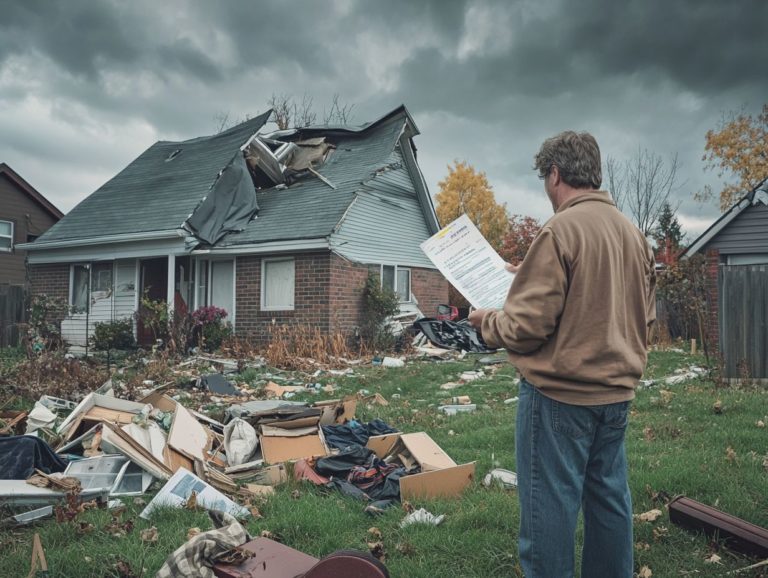How to Choose the Right Home Insurance?
Home insurance isn t merely a safety net; it s an essential investment safeguarding your most valuable asset your home.
With a range of coverage options available, it s easy to feel overwhelmed trying to determine what suits your needs best.
This guide simplifies the details of home insurance, covering the various types of coverage, key factors to consider when selecting a policy, and tips for comparing providers.
Whether you re a first-time homeowner or considering a reevaluation of your current policy, this guide will help you feel confident in your choices.
Contents
- Key Takeaways:
- Understanding Home Insurance
- Types of Home Insurance Coverage
- Factors to Consider When Choosing Home Insurance
- How to Compare Home Insurance Policies
- Tips for Finding the Right Home Insurance Provider
- Frequently Asked Questions
- 1. How do I know if I need home insurance?
- 2. What are the different types of home insurance?
- 3. How do I determine the level of coverage I need?
- 4. What factors should I consider when comparing home insurance quotes?
- 5. Can I make changes to my home insurance policy?
- 6. What should I do if I need to file a claim?
Key Takeaways:

Home insurance is crucial for protecting your property and personal belongings from unexpected damages or losses. Consider your location, property value, and personal needs when choosing a home insurance coverage that provides adequate protection. For more detailed guidance, check out how to find the best home insurance for your needs. When comparing home insurance policies, look for key features such as coverage limits, deductibles, and add-ons, and ask questions to ensure you understand the policy.
Understanding Home Insurance
Understanding home insurance is essential for every homeowner. It offers crucial coverage against various risks, including fire, weather damage, and theft, safeguarding you from significant financial setbacks. Before purchasing a policy, it’s important to know what you should do to ensure you’re adequately protected.
Homeowners insurance not only protects your property but also provides liability coverage. This can save you from big costs if claims are made against you.
Securing the right home insurance alleviates the financial burden associated with unexpected events, and knowing how to compare home insurance quotes can help you make informed decisions, allowing you to enjoy your living space with peace of mind, free from the constant worry about potential losses.
What is Home Insurance and Why is it Important?
Home insurance, often referred to as homeowners insurance, is a vital policy that offers you financial protection against various risks tied to homeownership, including property damage and personal liability.
This essential coverage gives you the power to safeguard your most significant investment your home by addressing potential unforeseen circumstances such as natural disasters, theft, or accidents that may occur on your property.
You have a range of coverage options at your disposal, including:
- Dwelling coverage, which protects the physical structure of your home.
- Personal property coverage for your belongings.
- Liability protection in case someone is injured on your premises.
By securing the right home insurance, you can alleviate the financial burden associated with unexpected events, allowing you to enjoy your living space with peace of mind. Before making a decision, it’s important to consider what you should do before buying home insurance, freeing you from the constant worry about potential losses.
Types of Home Insurance Coverage
You ll find an array of homeowners insurance coverage options tailored to meet diverse needs and circumstances. This ensures you re well-protected against a broad spectrum of risks, from property damage and theft to liability claims.
Different Types of Coverage and What They Include

Different types of coverage within homeowners insurance offer you robust protection, including dwelling coverage, personal property coverage, and liability coverage, each tailored to shield you from the unique risks of homeownership.
Dwelling coverage is your first line of defense, safeguarding the structure of your home from perils like fire, vandalism, and certain natural disasters. It ensures that any repair or rebuilding costs are effectively managed.
Personal property coverage steps in to protect your belongings, covering items such as furniture, electronics, and clothing from theft or damage. It s the safety net for all the treasures within your home.
Equally important is liability coverage, which protects you from legal claims that may arise from injuries or damages occurring on your property. Liability coverage protects you financially if someone gets hurt on your property. This means if someone trips and falls, your insurance can help cover their medical bills.
Now that you understand the types of coverage available, you ll often find yourself with a comprehensive safety net. This maximizes protection against a wide array of potential hazards and can lead to significant discounts on your premiums. It s a savvy financial move that pays off in the long run.
Factors to Consider When Choosing Home Insurance
When selecting home insurance, consider several essential factors: your location, the value of your property, and your individual needs. To learn more about these aspects, you can explore how to find the best home insurance type, as these elements play a pivotal role in shaping your insurance premium rates and coverage options.
Each factor significantly influences your decision, helping you find the right balance between adequate protection and cost-effectiveness.
Location, Property Value, and Personal Needs
The location of your home directly influences your homeowners insurance premium. Different areas come with varying risks, including natural disasters and crime rates.
When assessing how your location impacts insurance costs, look at local crime statistics and common weather patterns.
For example, living in a coastal area prone to hurricanes can lead to a noticeable increase in your premium, while a neighborhood with low crime rates may offer more affordable options.
Understanding your property’s value in relation to the local market and considering your personal needs like coverage for unique features such as a home office can provide clarity.
By examining these factors, you can make more informed decisions about your insurance policies.
How to Compare Home Insurance Policies
Comparing home insurance policies is crucial to secure the best coverage tailored to your needs.
This process allows you to look at different companies, explore their unique features, and analyze the premiums they offer for comparable coverage.
Taking the time to make these comparisons ensures that you make a well-informed decision that truly protects your home and investment.
Key Features to Look for and Questions to Ask

When comparing home insurance policies, pinpoint key features such as coverage limits, deductibles, and premium rates. Don’t shy away from asking the right questions; clarity is your ally.
Particular attention should be paid to specific risk coverages protection against fire, theft, and other potential hazards is essential. Evaluating customer service ratings can reveal how responsive the insurer is during critical times. A streamlined claims process can significantly ease your stress when unexpected events arise.
To clarify policy details, consider asking agents questions such as:
- “What types of natural disasters are covered?”
- “How does the claims process work in the event of a loss?”
These inquiries empower you to select a plan that truly meets your individual needs and circumstances.
Tips for Finding the Right Home Insurance Provider
Finding the perfect home insurance provider can be exciting! It demands thorough research and careful evaluation, including understanding how to evaluate your home insurance needs across various companies.
You ll want to consider their reputation for customer service, the range of coverage options they offer, and the support provided by their agents.
Taking these factors into account will help you make an informed decision that best suits your needs.
Researching and Evaluating Insurance Companies
Researching and evaluating insurance companies is essential for securing homeowners insurance. It allows you to assess customer satisfaction, financial stability, and the overall quality of the coverage they provide.
Understanding the nuances of various options can significantly influence your decision-making process. Start by checking the financial ratings of different insurers through reputable third-party agencies; these ratings reflect their ability to fulfill claims and maintain stability during economic fluctuations.
It s wise to read customer testimonials for valuable insights into real-life experiences with policies and claims handling. Pay close attention to the claims process; an efficient and transparent procedure can make all the difference when you need to file a claim.
Keep in mind that the responsiveness and transparency of an insurance company serve as strong indicators of their commitment to customer service, ultimately shaping the quality of your insurance experience.
Frequently Asked Questions
In summary, choosing the right home insurance is vital to protecting your investment and ensuring peace of mind. By considering your unique needs and comparing various options, you can find the coverage that suits you best.
Act now to secure the right coverage and protect your home! Start comparing home insurance options today to find the best fit for you!
1. How do I know if I need home insurance?

Home insurance is crucial for homeowners. It protects your property and belongings from damage.
If you have a mortgage, it’s usually required by lenders.
2. What are the different types of home insurance?
There are two main types of home insurance: building insurance and contents insurance. Building insurance protects the structure of your home, while contents insurance covers your personal belongings.
You might want to consider a combined policy for maximum protection!
3. How do I determine the level of coverage I need?
Your needed coverage depends on the value of your property, your possessions, and local risks. To better understand your options, make a list of your belongings and consult an insurance agent on how to ensure your home is properly insured to find the right coverage for you.
4. What factors should I consider when comparing home insurance quotes?
When comparing quotes, look at coverage limits, deductibles, and premiums. Also, check the company s reputation and customer reviews for added peace of mind.
5. Can I make changes to my home insurance policy?
Yes, you can change your home insurance policy anytime. Contact your insurance provider to adjust your coverage or add a new rider.
6. What should I do if I need to file a claim?
If you need to file a claim, contact your insurance company right away. They will guide you through the process and provide necessary forms.
Remember to document any damages and keep receipts for related expenses.






